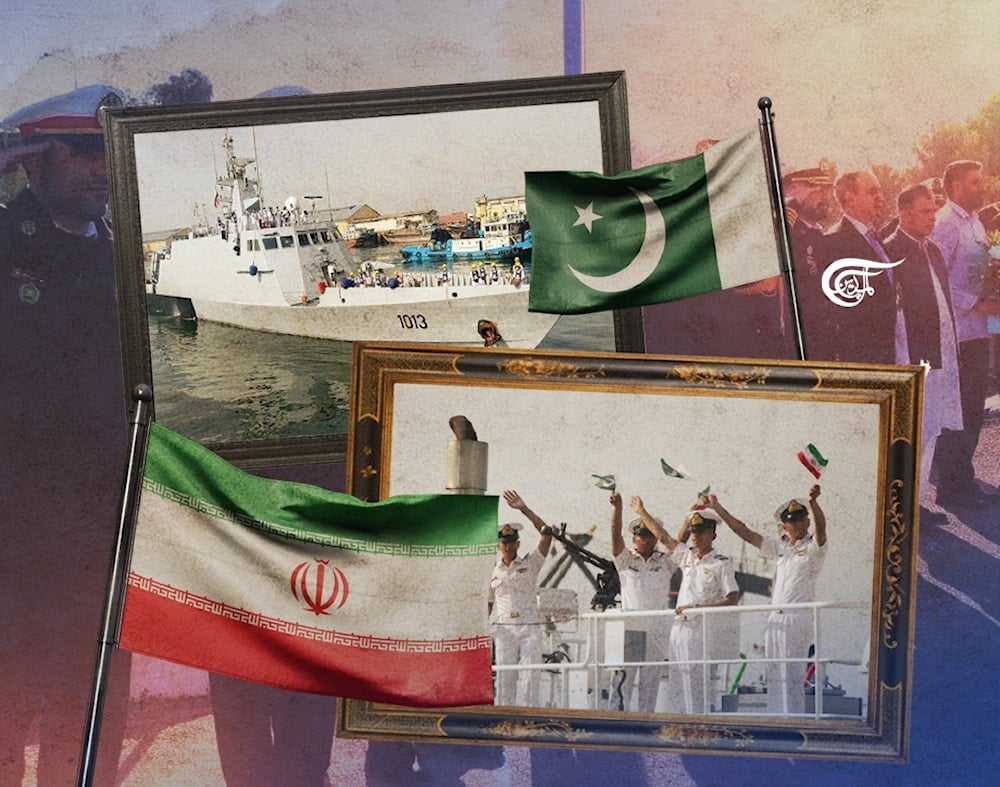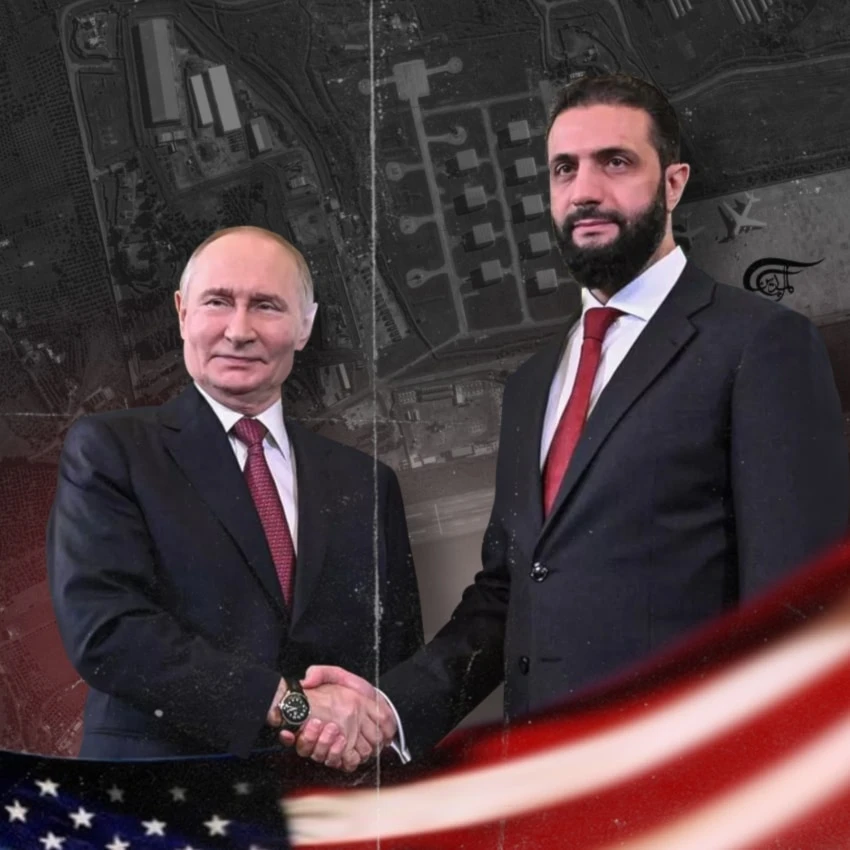Iran and Pakistan are stepping up their military cooperation as the US tightens its sanctions on Pakistan
Pakistan and Iran have strengthened defense ties through joint military efforts amid US sanctions on Pakistan's defense sector, signaling a shift towards regional cooperation and reduced reliance on Western influence.
-

The Pakistan Navy stated on Friday that the visit was yet another significant milestone in the development of defense relations between the two neighboring countries (Illustrated by Ali al-Hadi Chmeis to Al Mayadeen English)
As the New Year dawned, Pakistan and Iran marked a new chapter in defense and military collaboration with the Pakistani naval ships cruising into Iran's port of Bandar Abbas on Friday, January 3, as part of an “overseas deployment” in the Arabian Gulf. The senior naval commanders of both nations also had crucial meetings, discussing, among other things, the possibility of boosting “interoperability” to address common issues, such as marine security and regional stability.
It was the first major military engagement between the two countries since the US imposed sanctions on Pakistan's state-owned defense corporation, National Development Complex (NDC), in late December of last year for what State Department spokesperson Matthew Miller described as the "proliferation of weapons of mass destruction (WMD) and their modes of delivery." Along with the NDC, the US bracketed three Karachi-based business firms.
A transient reaction or a wind of change
The Pakistan Navy stated on Friday that the visit was yet another significant milestone in the development of defense relations between the two neighboring countries. The visit also encompassed discussions regarding the promotion of maritime cooperation, exchange programs, and high-level contacts between Iranian and Pakistani naval authorities, a statement issued in Karachi read.
The Navy emphasized the significance of "the recent naval initiative of visiting Iran demonstrated the shared objectives of addressing common maritime concerns and promoting regional security as Iran and Pakistan continue to deepen their defense and military partnership."
Pakistan and Iran have a longstanding heritage of defense cooperation. This involves a variety of military cooperation initiatives, including the development of armaments, the execution of defense agreements, and the training of military personnel. Both nations have resolved to improve their security cooperation and demonstrate mutual respect for the sovereignty of each other.
It was in this spirit that General Asim Munir, the chief of the Pakistani Army, visited Iran in July 2023 to meet General Mohammad Hossein Bagheri, the chief of staff of the Iranian Armed forces. Notably, this high-profile interaction between Pakistan and Iran comes weeks after they, along with China, reached a trilateral security agreement. The meeting focused on the military and strategic cooperation between Pakistan and Iran, emphasizing their ongoing collaboration for strengthening border security to check the infiltration of militants.
In contrast to the explosive and tense geopolitical environment in 2017, when the former army chief, General Bajwa, paid a three-day visit to Tehran amid an air of mistrust and rivalry in the Middle East, Pakistan's current army chief flew to Iran at a time when Iran and Saudi Arabia have much better interaction and working relations following the China-brokered Saudi-Iran rapprochement in Beijing.
Following the withdrawal of US and NATO forces from Afghanistan in 2021 and the historic rapprochement agreement between Iran and Saudi Arabia in Beijing on March 10, 2023, the defense and military cooperation between Tehran and Islamabad has been on an upward trajectory.
A testament to the dedication of both Iran and Pakistan to the improvement of their relations and military cooperation was a day-long joint naval training exercise in the Strait of Hormuz and the northern Persian Gulf last January. The declared objectives of the naval exercises were to enhance the quality of training interactions, foster military relations, and execute bilateral maritime agreements. Combat vessels and missile-launching warships from the naval forces of both countries participated in the exercises that proceeded off the coast of Bandar Abbas.
Yet another indication of Iran-Pakistan's growing military collaboration is Iran's desire that Pakistan join the regional and extra-regional alliances the Islamic Republic intended to establish to improve regional security through collective naval cooperation. According to the Iranian media report, Saudi Arabia, the United Arab Emirates, Qatar, Bahrain, and Iraq showed willingness to participate in the joint naval force.
Will the US action backfire?
The first-ever US action against a Pakistani government entity, which sparked a wave of discontent across the country, did not fare well with the military hierarchy. The accusation of WMD proliferation against the NDC, a defense-based state agency in charge of developing the country's long-range ballistic missiles, unwittingly shifted the blame to the Pakistani army.
It was after the US sanction that Pakistan’s social media, humming with suggestions to retaliate, came out all praise for the Iranian principled stand on global issues, including the worst genocide and ethnic cleansing in history perpetrated by the Zionist state against Palestinians with support from the US.
Some netizens proposed that the government should now change its course and keep its own interest ahead of anybody’s agenda. In so far as Iran was concerned—despite calculated efforts from some quarters to create a wedge between the two nations on religious grounds, a score of Twitterati suggested that Pakistan should now immediately resume work on the Iran-Pakistan Gas Pipeline and avoid seeking any guidance or permission from the US.
Pakistan’s Foreign Office, which is mostly fed by the powerful army, has come down hard on the selective US policies and sharply condemned the new US sanctions imposed on its National Development Complex and three business firms, describing them as "discriminatory" and "unfortunate." They raised concerns about Washington's actions, which they feel could have major “consequences.”
Interestingly, the United States used the same rationale for WMD when it invaded Iraq in 2003. The US used the presence of WMD and suspected war crimes as excuses to remove and eventually hang Saddam. It made little difference then that the claims were eventually proven to be false when the Iraq Survey Group (ISG) declared in its October 6, 2004 report, delivered to the US Senate Defense Standing Committee, that it had discovered no evidence that Iraq had produced any WMD since 1991.
What does the NDC do?
At the NDC, a state-owned facility in Fateh Jang, Rawalpindi about 40 kilometers (25 miles) southwest of Islamabad, the National Engineering and Scientific Commission (NESCOM) gives the Pakistani military the technology it needs to make missiles, land-based weapons, and naval systems.
The NDC initiated the development of a missile program, known as the Integrated Missile Research and Development Program (Hatf Program), intending to create solid-fuel rockets and missile systems. The NDC receives the missile components from diverse facilities for final integration.
The NDC is under the supervision of NESCOM, which also deputes engineers to assist with the initiatives. Nasr (Hatf-IX), a solid-fueled tactical ballistic missile system, and Babur (Hatf-VII), an all-weather, subsonic cruise missile that the Pakistan Navy deployed in 2018, are among the projectiles and armaments that the NDC has developed in collaboration with NESCOM.
Furthermore, the NDC has developed a "starfish naval mine" that can be deployed by aircraft, ships, and submarines to target submarines and ships. Similarly, the Ghauri (Hatf-5) is a liquid-fueled, medium-range ballistic missile (MRBM) that draws its base from the North Korean Nodong missile. The Complex also developed yet another MRB missile, namely Shaheen II (Hatf-5) and Shaheen-1 (Hatf-4), which is a scaled-up version of the M-11 missiles.

 F.M. Shakil
F.M. Shakil
 7 Min Read
7 Min Read











